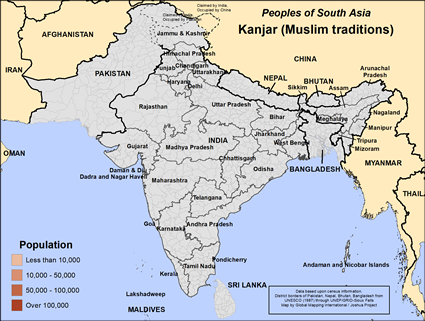Kanjar (Muslim traditions) in Pakistan

Send Joshua Project a photo
of this people group. |

Map Source:
People Group data: Omid. Map geography: UNESCO / GMI. Map Design: Joshua Project
|
| People Name: | Kanjar (Muslim traditions) |
| Country: | Pakistan |
| 10/40 Window: | Yes |
| Population: | 11,000 |
| World Population: | 26,000 |
| Primary Language: | Saraiki |
| Primary Religion: | Islam |
| Christian Adherents: | 0.00 % |
| Evangelicals: | 0.00 % |
| Scripture: | New Testament |
| Ministry Resources: | Yes |
| Jesus Film: | Yes |
| Audio Recordings: | Yes |
| People Cluster: | South Asia Muslim - other |
| Affinity Bloc: | South Asian Peoples |
| Progress Level: |
|
Introduction / History
The Kanjar people were once nomads who roamed throughout South Asia. They were distrusted, discriminated against and marginalized.
Muslim Kanjars have their own subgroups, many of which have their own language and culture. Muslim Kanjar people live in India and Pakistan.
What Are Their Lives Like?
Today the Kanjar people are usually millers, farmers, day laborers or small businessmen. They have their own cultural art forms including music, dance and storytelling.
The Kanjar people in Pakistan have organized themselves to protect their rights as a community. They hope to eliminate the stigma of their nomadic past, which sometimes involved prostitution. They are trying to improve their access to schools and hospitals so they can enjoy a higher standard of living.
What Are Their Beliefs?
These Kanjar people are Sunni Muslims who believe that the supreme God, Allah, spoke through his prophet, Mohammed, and taught mankind how to live a righteous life through the Koran and the Hadith. To live a righteous life, you must utter the Shahada (a statement of faith), pray five times a day facing Mecca, fast from sunup to sundown during the month of Ramadan, give alms to the poor, and make a pilgrimage to Mecca if you have the means. Muslims are prohibited from drinking alcohol, eating pork, gambling, stealing, slandering, and making idols. They gather for corporate prayer on Friday afternoons at a mosque, their place of worship.
The two main holidays for Sunni Muslims are Eid al Fitr, the breaking of the monthly fast and Eid al Adha, the celebration of Abraham's willingness to sacrifice his son to Allah.
Sunni religious practices are staid and simple. They believe Allah has pre-determined our fates; they minimize free will.
In most of the Muslim world, common people depend on the spirit world for their daily needs since they regard Allah as too distant. Allah may determine their eternal salvation, but the spirits determine how well they live on a daily basis. For that reason, some Muslims appease spirits using charms and amulets to help them with spiritual forces. More orthodox Muslims consider these practices heretical and un-Islamic.
What Are Their Needs?
The Kanjar people need to put their hope in the King of kings, realizing that he is the one who gives them worth and dignity.
Prayer Points
Pray for loving workers to go to the Kanjar people until there are disciples who make more disciples.
Pray the Lord will prepare the hearts of the Kanjar to understand and to believe the gospel.
Pray for the Lord to bless the Kanjar people with adequate education and medical facilities.
Pray for the Lord to bless the Kanjar people so abundantly that they will see he is the only one worthy of praise and worship.